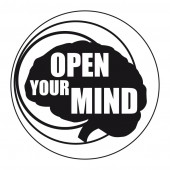Visualizing Mental Illness
This blog, Recovering from Mental Illness, allows me to explore many different topics. This post, "Visualizing Mental Illness" might be a bit tough to delve into, but I believe it's an important, albeit confusing, issue. Let's give it a fair shot.
What Does 'Visualizing Mental Illness' Mean?
 Let me be honest: I'm as unsure as you are, but the topic hit me while on my first coffee and it started to take shape, warped, but worthy of exploration. Mental Illness is considered an 'invisible disease.' Sometimes, most of the time, this is accurate.
Let me be honest: I'm as unsure as you are, but the topic hit me while on my first coffee and it started to take shape, warped, but worthy of exploration. Mental Illness is considered an 'invisible disease.' Sometimes, most of the time, this is accurate.
But society has a twisted visualization of what a mentally ill person might look like. Perhaps we talk to ourselves? Throw things, scream at plants and passing vehicles, live underneath a bridge, don't bathe or brush our teeth. The stuff in bad Hollywood movies (and a few unfortunate Sundance films). The stuff that is completely damaging, stigmatizing, and--without using an explicit to my advantage--complete bollocks.
This belief, visualization, is limited to an uninformed minority. Most people know someone who struggles, at some point or another, with a mental Illness. For the purpose of this post, I don't want to focus on what other people might believe us to act like---no, I want us to visualize our illness.
What Does Your Mental Illness Look Like?
 Think about this for a moment--but not for too long. What comes to mind? Focus on the image it conjures. What does your mental illness look like? It's like climbing through dense cobwebs; we have been trained to understand our illness on a purely practical level. We describe it in words. But a picture, bless the cliche, is worth a thousand words. Give it a shot.
Think about this for a moment--but not for too long. What comes to mind? Focus on the image it conjures. What does your mental illness look like? It's like climbing through dense cobwebs; we have been trained to understand our illness on a purely practical level. We describe it in words. But a picture, bless the cliche, is worth a thousand words. Give it a shot.
What comes to mind?
My first images are sort of surprising. I thought I would picture something with horns; huge claws. A spider or ten. But I see myself sitting at the table when first diagnosed. The young woman at the table looks like me--she is me. I guess that pushed denial out the door.
I see myself with my knees to chest, rocking back and forth, praying for it to stop. For relief. And then: bottles of pills. Christ, I thought this might be a bit more positive. But the experience has been largely dark. I feel a bit deterred...I keep searching...and I visualize my illness as something that walks behind me. That makes sense. That's what mental illness feels like to me. And then it walks beside me. And we've learned how to walk together.
The Benefit of Visualizing Mental Illness
Think of it this way: when you meet somebody, someone new, you work to put a face to the name. You visualize the person and then apply the name after you walk away. Or, if you have a better memory than I do--and here is to hoping you do--you remember on first glance.
But that's not my point. I have one--I promise you.
Sometimes, when we don't feel well. we are without words. Being asked, "How do you feel?" can be confusing. A pain in the ass. Perhaps you cannot find words for it. But what if you visualize it? What if you try to describe your feelings based on an image?
Let's work to answer the question again: "How do you feel?" Now, picture how you feel. Is it dark in your mind? Do you picture yourself stuck within four walls? This image can portray a state of depression. If you cannot find words, visualize how you feel.
This might be an alternative view, I'll go out on a limb and assume that it is, but it's interesting. I have enjoyed writing about it, and I hope that it might be a tool for some people. After all, we spend our entire lives visualizing our future, recalling our past in pictures, it makes sense to visualize our illness to our advantage.
APA Reference
Jeanne, N.
(2011, December 29). Visualizing Mental Illness, HealthyPlace. Retrieved
on 2026, March 4 from https://www.healthyplace.com/blogs/recoveringfrommentalillness/2011/12/visualizing-mental-illness
Author: Natalie Jeanne Champagne
My imagery is of a giant. He is as tall as the ceiling in my house and looks like one that might be described in a childhood fairy tale. Maybe Jack and the Beanstalk. He's too mighty and powerful to defeat nevertheless I must face him each day. And on some days I'm even grateful that he's around.
I visualize a shadowy figure from within the confines of a dark room coming into the room, letting light into the room from behind a closed door. Upon opening this door, light is coming in, but the room is still dark. I wonder if the figure in my vision will turn on the lights? I am not sure if it is a woman or a man, but he/ she is no doubt my savior. Maybe I will find them? Someday. -B.
Benito,
What powerful imagery. Almost poetic. Thank you for sharing! And I believe you will find it.
Sincerely,
Natalie
The process of visualizing Mental Illness is the crucial step to overcome successfully the dense cobweb of any psychiatric entity. Moreover, when it is deeply rooted in collective consciousness that mental disorders are sneaky as well as shameful diseases. For this and many other reasons it is advisable to detect in early phase the symptoms to any psychic disturbances in daily life functioning. Indeed, this subtle observation seeks a bit sense to perceive more carefully spontaneous any unexpected behaviour of respective person. In this direction, it would be of great importance our forerunner knowledge on set of global dealing with others to concrete person who express any surprising conduct. Besides these disorders in interpersonal relations, the decrease abrupt of professional productivity indicates too much in discovering of mental illness.
Very good post. I often have a hard time saying what I feel, though I enjoy speaking in metaphors and similies. I find I can say things better when I compare my feelings to other occurances. Visualizing helps this a lot.
I picture myself on a roller coaster. I love thrill rides, but this one goes extremely high... high enough that I can't see the top of it. It also goes deep underground (and there are no lights). At first everything is okay, then the ride speeds up and I go either up or down extremely fast. Sometimes I will try to unbuckle myself from the ride and jump, not caring if the fall kills me, just to escape the ride. It hasn't worked yet, obviously. The restraints are tight, and although I hate them for being so tight, they hold me in and have saved my life many times.
That's the metaphor I use, anyway. Once again, great post. :)
Hi, Ash:
Thank you for the positive feedback! I really did enjoy writing this one. Metaphors and similies have become 'the language of mental illness in my lif'e--my psychiatrist has to clarify a lot:)
What a great visualization you have. Inspirational. Thank you so much for sharing.
Sincerely,
Natalie
I myself, am not included as part, but only as an observer I have an image of a large cone shaped shadowed black mountain with bubbling neon bright red, slowly flowing lava oozing down from out of the top and it's flow branches out into smaller faster moving streams in tracks around rocks or raised patches, (like human blood flows in the nervous systems) and it's emphasized with haze like steam that rises from it throughout the canvas.
Hi Mary:
I understand feeling like an observer. I must admit; it would have been easier that way. Your imagery reminds me of a painting--large and bright, messy but beautiful. I hope that makes sense--it's what came to mind reading it:)
Natalie
I visualize myself at the bottom of a hole, trying to claw my way up. People reaching their hands for me but me not being able to grab on to them. They are just out of reach.
This makes a lot of sense and I wish I had thought about it yesterday when my psychiatrist asked me how I was feeling. I never can find the right words. But this would have worked.
Thanks,
Michele
Michele,
I can totally relate to this image. It reminds me of addiction. I am glad the idea helped you. Strangely, this post was the most helpful for me:)
Take Care and thank you for supporting my writing:)
Natalie